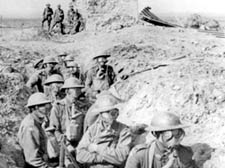|
|
 |
| |

Trench war in Ypres, 1917 |
Brief and lively history of a major bloodbath
World War One: A Short History.
By Norman Stone.
Penguin Books £7.99
THE First World War grew from a
seemingly isolated event in June 1914 – the assassination of Archduke Franz Ferdinand of Austria in Sarajevo – to engulf Europe and most of the world in an unprecedented bloodbath.
It lasted far longer than those who went so enthusiastically to war in August 1914 thought it would, brought
revolution in Austria-Hungary, Germany and Russia, and laid the seeds of the even greater war that broke out in 1939.
It is therefore a huge, complex and tragic
subject, and one that has provoked enormous debate on its causes, course and outcome.
In contrast, Norman Stone’s World War One is short, clear and
entertaining.
If he paints with a broad brush, he
manages to incorporate many telling vignettes. The underlying horror of the events he describes also gives the blunders, misconceptions and misfortunes of the political leaders and generals a rich but sinister irony.
His broad outline is one that historians will find mostly familiar. He accepts that Germany was keen to provoke a war, as it thought it could defeat Russia and France in 1914 but not later.
He is good on the critical importance of railways in the
mobilisations of 1914. The ability to move troops by train to staunch enemy
offensives also imposed stalemate in the west.
By 1918, however, the Germans, although they had already beaten
Russia, establishing at Brest-Litovsk an
eastern Europe looking remarkably like that of the present day, had to win quickly. They made one final attempt to win in France and Belgium. The failure of this offensive led to implosion in Germany and finally to the Armistice of November 11.
As might be expected from a historian who made his name with a book on the Eastern Front, he covers the war in the east as well as the west, with an inside knowledge of the governments and high commands of Germany, Austria-Hungary, Italy and Russia, as well as those of Britain and France.
He is particularly well-informed about, and sympathetic to Turkish aims and
reactions.
While World War One is a good, if short and informal summary of the war, it is the provocative asides and other snippets that give it its character.
From among dozens, here are a few:
Italy started the war by invading Libya and destabilising the Ottoman Empire.
The gravest mistake of the 20th century was the German
decision to build a navy to rival Britain’s.
It was the length of railway platforms that gave away plans for military attacks.
The Tsar licked his own stamps as part of the Russian war effort.
The French taxi-drivers who saved Paris at the Marne kept their meters running.
Finally, Lenin’s sealed train through Germany to start the Russian Revolution was the first non-smoking train.
Martin Sheppard
|
 |
|
 |
 |
|
 |
|



